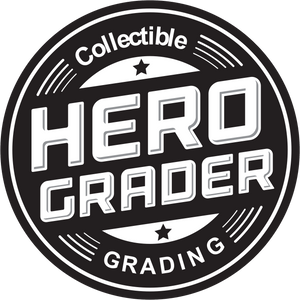They say necessity is the mother of invention. In our case, frustration may have beat her to it. Like you, we've been beholden to the whims of the major third-party grading companies for years. We paid our subscription fees, paid our invoice fees, paid our grading fees, paid our expedited service fees, then crossed our fingers, tossed our books into the abyss, and waited months, and months for our books to return.
Delays and long turnaround times weren't solely the fault of the grading companies. The market exploded in recent years, and demand similarly increased. Be that as it may, on the other side of all that money, time, and patience came a box of heavy, bulky, hard plastic cases that forever vaulted our books. After a while, the piles began to accumulate and compete for our limited space. There really wasn’t much we could do about it though. Options were limited, and demand for graded books was ever increasing. While we appreciated the fortress like protection plastic “slabs” provided, the cost, time, storage requirements and simple unattractiveness of graded books made them increasingly difficult to justify. As the weeks and months went by and our collective frustration grew, we decided it was time to develop another option, one that provides an alternative to traditional grading.
And we weren't alone. There seemed to be a large consensus of the comic book community that felt the same way. We spoke with customers, collectors, retailers, and comic enthusiasts, all of whom shared our discontent in some way or another (and many whom for years had been relying on us to pre-grade their books). We bounced ideas off everyone we could, rejecting most, clinging to the best. At the end of it all we came up with Hero Grader, an alternative grading approach, which we’re thrilled to share with you now.
We initially addressed price, since in our minds it was the most egregious of offenses. To us, grade tier pricing is nothing short of ridiculous – a confusing, complicated menu of price options that make it challenging to ascertain the true cost of grading a comic. It also provides too much opportunity for customers to “skip the line” by simply paying more for the same services, contributing to processing delays and the inability to estimate turnaround time. We decided to end all that nonsense, instead opting to grade every book, every era, every value, for one standard price. Additionally, we’ve adopted a strict first-in, first-out approach. No more skipping ahead because you were willing to pay for attention.
We turned to grading standards next, both the grading scale and types of grades. Like many, we believe the ambiguity over whether a book lands in a restored grade, conserved grade, qualified grade, etc., introduces way too many variables. There are obvious overlaps, too – is a missing value stamp a universal grade or a qualified grade? Is a tear seal restoration or conservation? To us, the question is simple: has the book been altered in a way that is intended to improve, hide, or otherwise conceal a defect? If the answer was yes, it should be noted as such. If not, the book should be graded as it stands. Hero Grader has therefore adopted two grading scales, Standard and Altered, the latter of which captures books that have traditionally been labeled restored, conserved or similar. Books are graded based largely on the standards developed in The Overstreet Guide to Grading Comics, an industry mainstay for many years and readily accessible, understood, and transparent.
Finally, the plastic. Look, we don’t deny the hard plastic carriers offer fantastic protection and minimize risk of damage – a benefit not only because it protects the integrity of the book, but also the integrity of the grade. We just think the plastic carrier is unnecessary in many cases, and strong evidence suggests it may even be harmful to the long term health of the book. For years the gold-standard of archival level storage has been Mylar sleeves and acid-free backing boards. Simple, unobtrusive, and easy to store, there is no practical reason why graded books cannot be kept this way. We use a 2mm Mylar and 1/16,” laser cut, acrylic backing board. Both are made in the U.S., and we don't know of any grading company or comic supply distributor that can say the same thing. Recognizing that graded books provide resellers and collectors comfort in knowing that a graded book is and remains in the condition noted on the label, we adopted tamper-evident sealing to make meddling hands easier to detect, and complimentary imaging, so that anyone can see the book as we saw it when we assigned the grade. Again, we listened to the market's request for simplicity.
As an added benefit our packaging is reversable, without the need for pry bars, saws, screwdrivers, and whatever other tools you have to call upon to crack a slab. You want to actually read that book you bought? No problem, remove the label and seal and dive right in.
We know our solution won’t necessarily replace traditional plastic slabs in every instance, but it does provide an attractive compromise, one that is faster, more cost effective, transparent, and enthusiast friendly. We also understand our concept won't be for everyone, but with so many collectors wanting to go back to basics - and the millions of books calling our name - we just couldn't resist jumping in with both feet. We welcome all comments, concerns (and of course kudos) as we delve into this and strive to be the best we can be!

